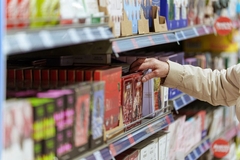
- Industry news
Industry news
- Category news
Category news
- Reports
- Key trends
- Multimedia
- Journal
- Events
- Suppliers
- Home
- Industry news
Industry news
- Category news
Category news
- Reports
- Key trends
- Multimedia
- Events
- Suppliers
Sugar Waste Product Reduces Formation of Apple Scab Ascospores

The Wageningen researchers also found vinasse to considerably stimulate leaf degradation during winter. This even more reduces the quantity of scab inoculum in the orchard since the fungus is overwintering in leaves.
16/01/07 Researchers at Wageningen University and Research Centre have shown that the fermented waste product of the sugar processing industry vinasse, reduces the formation of apple scab ascospores by more than 95 %. This is a breakthrough in organic apple growing because it means that autumn application of vinasse may strongly reduce the presence of this important disease in orchards.
The Wageningen researchers of the institutes Applied Plant Research (PPO) and Plant Research International (PRI) also found vinasse to considerably stimulate leaf degradation during winter. This even more reduces the quantity of scab inoculum in the orchard since the fungus is overwintering in leaves.
PPO and PRI are intensively cooperating with various European partners on sustainable scab control in organic apple growing. Apple scab is caused by a fungus (Venturia inaequalis) and is a major economic problem in all apple growing areas. The disease develops extremely well in climates with rainy spells in spring. The disease develops dark brown lesions on leaves and fruits, which makes them difficult to sell. Vinasse is a fermented waste product of the sugar processing industry and is used on a small scale as fertilizer in organic fruit growing.
Leaves with apple scab symptoms were placed between iron nettings and then dipped into different concentrations of vinasse in autumn. The vinasse concentration range was 50, 100, 200, 400 and 600 l per ha when recalculating the dipping concentration used during the experiments towards a commercial application in the orchard by treating the dropped leaves on the soil. Subsequently, the nettings were placed on the soil in an organic orchard. Leaves degraded naturally during winter and the remains of the leaves were examined for the presence of apple scab ascospores in early spring. The highest reduction in ascospores of more than 95 % was found at a dose level of 200 and 400 l vinasse per ha. This is a normal dose for soil fertilization in organic orchards.
Organic growers in Europe largely depend on copper, sulphur and lime sulphur to fight apple scab in spring and summer. Apple growers can now substantially reduce apple scab inoculum by leaf shredding and autumn application of vinasse. These sanitation practices help to reduce the use of copper in spring. This is a step forward in sustainable organic scab control, since copper is no longer allowed in the Netherlands for this purpose while the European Commission has decided to ban the use of copper throughout Europe.
This study was carried out in the context of the EU project REPCO (project no. 501452), which stands for Replacement of Copper in Organic Production of Grapevine and Apple in Europe, and is partly financed by the 6th Framework Programme of the European Commission. The goal of this project is to find alternatives for the use of copper in organic grapevine and apple production.










